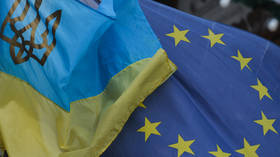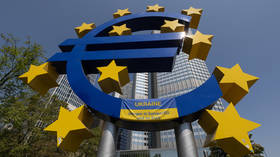Ukraine responds to Macron EU plan

Kiev’s top diplomat and ambassador to Germany have dismissed a proposal by the French President on Ukraine’s accession to the EU. Last Monday, Macron said that Kiev could not expect to become a member state in the near future, suggesting the creation of a “European political community” made up of aspiring nations instead.
In a twitter post on Thursday, Ukrainian Foreign Minister Dmitry Kuleba argued that “strategic ambiguity on Ukraine’s European perspective practiced by some EU capitals in the past years has failed and must end.” He went on to claim that the said ambiguity only served to embolden the Kremlin. The Ukrainian official emphasized that his country did “not need surrogates for EU candidate status that show second-class treatment of Ukraine and hurt feelings of Ukrainians.”
Strategic ambiguity on Ukraine’s European perspective practiced by some EU capitals in the past years has failed and must end. It only emboldened Putin. We do not need surrogates for EU candidate status that show second-class treatment of Ukraine and hurt feelings of Ukrainians.
— Dmytro Kuleba (@DmytroKuleba) May 19, 2022
Kuleba’s message echoed the opinion of Ukraine’s ambassador to Germany, who commented on Macron’s proposal during an interview with France’s Les Echoes newspaper last Wednesday. Andrey Melnyk told journalists that he was “very skeptical” about the French president’s idea, adding that “offering this substitute for formal membership is like reinventing the wheel.”
“Either we are in the EU or we are outside,” Melnyk declared.
The diplomat also said that Kiev expected more courage from Macron with respect to Ukraine’s EU bid now that he has won the presidential election.
The remarks came in response to Emmanuel Macron’s proposal he made during the EU conference on the future of Europe last Monday. Speaking of Ukraine, the French President noted that “even if we gave them candidate status tomorrow, we all know perfectly well that the process of allowing them to join would take several years, in truth doubtless several decades.” He, however, acknowledged that Ukraine and the likes of Moldova and Georgia wanted to join the bloc as soon as possible in the face of Russia’s offensive. As a stopgap measure to accommodate those nations’ aspirations, Macron suggested setting up a “European political community,” naming it nothing short of the EU’s “historic obligation.” According to the French president, such a structure “would allow democratic European nations ... to find a new space for political cooperation, security, cooperation in energy, transport, investment, infrastructure, the movement of people.”
The idea was lapped up by the President of the European Council, Charles Michel, who posted a tweet on Wednesday, calling for the “creation of a European Geopolitical Community.”
I call for the creation of a European Geopolitical Community. The aim is to forge convergence and deepen operational cooperation to address common challenges, peace, stability and security on our continent.#EESCPlenary@EU_EESCpic.twitter.com/XKSucel4YK
— Charles Michel (@eucopresident) May 18, 2022
Speaking in the Bundestag on Thursday, German Chancellor Olaf Scholz concurred with the French president, warning that Ukraine could not expect to join the EU within “a couple of months or a few years.” Scholz said that it would be unfair to candidate nations of many years in the Western Balkans if Ukraine was given a “shortcut.”
However, the bloc is currently focusing on providing the Eastern-European nation with “quick and pragmatic” support, Scholz assured.
In an interview with the Financial Times in early May, Austria’s Foreign Minister Alexander Schallenberg, for his part, urged Brussels to rethink the EU’s accession process. The diplomat spoke in favor of granting neighboring states rapid access to “parts of the common market” and to selected EU institutions and programs as part of a transition toward full membership. Schallenberg claimed that the “Eastern Partnership we have developed does not work,” calling for a thorough revamp of the “whole conception [of the] neighborhood policy of the EU.” In the same breath, the Austrian official noted that the membership bids of countries like Albania, North Macedonia and Moldova should be considered an equal priority as that of Ukraine.
Austria’s Minister for the EU and constitution, Karoline Edtstadler, clarified that Ukraine was unlikely to enter the European family “in the next five to ten years.” The official pointed out that “countries in the West Balkans have been waiting for decades for the next step.” Edtstadler added that “there can be no accelerated procedure for Ukraine.”
Meanwhile, Baltic states and Poland have been lobbying hard for Ukraine’s accession to the EU recently.
Kiev lodged a formal bid to become a member state shortly after Russia attacked the country in late February. It is expected that the European Commission will make its position known in June this year.
However, getting the official candidate status does not necessarily mean a speedy accession as evidenced by the cases of several aspiring nations.














